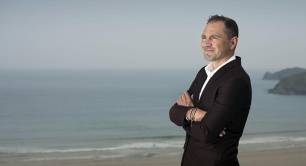Day in the life: Paul Lindley
My day can be very different with the different hats that I wear. I set the alarm relatively late at about 7.30 or 8am, get up and go into the gym at home for an hour of cardio; some cross training, some weights, sort of passively thinking about what’s ahead in the day. I also check emails, social media and online news to find out what’s been happening overnight within about ten minutes of getting up.
When we started, we set up Ella’s Kitchen from home so we had about 11 people coming to our house. Now we have some barns about five miles away from where I live with 70 or 80 people working in them.
Although I sold the business in 2013 I still have a kind of Chairman role, trying to deliver our mission which is to improve children’s lives by helping them develop a healthier relationship with food. That means using our skills and experience for new recipes, using new ingredients to try and improve the quality of food and encourage awareness of diet and nutrition.
We also use our influence in the industry with politicians and policy formers to try and get things changed in a broader sense in society, like trying to reduce obesity and malnutrition levels.
We’ve written reports that have been referred to in parliament, have lobbied for changes in legislation and piloted community projects that try to encourage behaviour change. All of that is trying to use the credibility we have with our brand so that we can create profits to use on our social purpose, which is to change children’s lives. That’s what really still excites me.
I didn't set up a business to create as much money as I could for myself
I might also be working on Paddy’s Bathroom, which has been going for 18 months now and has provided clean water for 70,000 kids in Rwanda. From the very beginning I‘ve tried to prove that we can create a business that can be sustainable by making profits and by using the brand to reach out to stakeholders to create a better world for somebody else.
We try to connect emotionally with our customers, who are interested in natural, safe, clean products for their families, to create safe clean water in another part of the world. We try and tie families together with technology – you can put the the batch code on the products into our website and find out where the village is in Rwanda that your money is going towards.
I didn't set up a business to create as much money as I could for myself. I had an idea that was about creating value for other people, creating money from that and being able to change society. I think capitalism needs to completely evolve and change if it’s going to be fit for the 21st century.
I tend to travel quite a bit for work, one of the reasons being that I set up a social enterprise with Sudanese ex-child soldier and current hip hop artist Emmanuel Jal called The Key is E around using education and entrepreneurship to improve children’s lives in Africa by empowering that continent’s social entrepreneurs. So we have a pilot rolling out next year with entrepreneurs in Kenya whose businesses help children.
Everyone works now in a different way than they did in the 20th century. Everyone previously was seeking a work life balance and I don’t think that exists anymore. If it’s your children’s sports day, you should go because you’re not going to be going to sports days for very long.
The flip side of that is we all answer emails in the evening. We all work to deadlines and that means the boundaries between work and life are completely blurred. I tend to work relatively late. If there is a big decision to make I like to think about it during the day and overnight and know that the big decision I was going to make is the right one.


